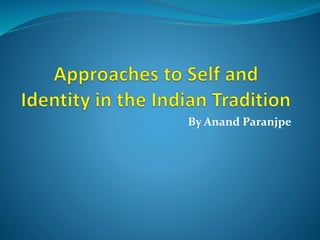
Comparing Views of Self and Identity in Western and Eastern Philosophy
- 2. The approach … In the Western world In the orient Self, ego and identity The division of : Self as subject Vs. Self as object (William James) Identifies and interprets identity as a mere “sense” of self-sameness. No mention of the experience of self-sameness. Atman, ahamkara and the concern for self-sameness (nitya-anitya viveka) The division of : Vishayin (subject) and Vishaya (object) The tradition of Yoga and Advaita speaks about a firm foundation for self-sameness.
- 3. Influences of the Western-world philosophers… The empiricist tradition The rational tradition This school of thought was based on the works of David Hume, an 18th-century Scottish philosopher. Mainly denied the self and the concept of self-sameness because it essentially was not ‘measureable’. Rejected ‘causality’. This school of thought was based on the teachings of Rene Descartes and Immanuel Kant. Affirmed the concept of the self on the other. Strong belief in causality in order to grasp an idea and therefore acknowledged the “self” as the knower that remains the same with the passage of time.
- 4. Vis-à-vis the philosophy in the sub- continent… Upanishadic thought Buddhist thought The ‘Self’ has been described as the ‘Atman’ and the Vedanta has lain emphasis on that self as the observer/seer. This paved the way for the Samkhya school of thought that speaks about the observer (Purusha) and the observed (Prakriti). The ‘Self’ was denied through the process of ‘Anatta’. Anatta is the rejection of all material things that are said to cause attachment and pain.
- 5. Yoga and Advaita The flow of thoughts can be, through discipline and careful practice, controlled and eventually, stopped altogether (Yoga Sutras by Patanjali). Only then does the mind reach the “fourth state” as spoken about in the Mandukya Upanishad. These thoughts are what Patanjali calls “chitta-vrittis”; which like a river (chitta-nadi : Vyasa); flow through the mind. The ego is thus effaced and the stage that follows ultimately is called Samadhi. Advaita speaks about the self as the witness and the only factor that is changeless.
- 6. Advaita and pre-Renaissance western philosophy Hume too had rejected the self but the assumption in the Western world is in stark contrast to that in India. The Indian tradition has been built upon the foundation of karma and rebirth. The west on the other hand believes in a single life, is achievement-focused and is not based on the concept of cause and consequence. Advaita focused on the Drg or the one that witnesses. Buddhism spoke about withdrawal from the senses and the achievement of Nirvana.
- 7. Behavioral psychology in the west The western belief was that the self is being controlled by an outside force over which we can have no control. The psychologists refused to enter the vicissitudes of the mind and dismissed it as an “impenetrable mystery”. It is thus that the desire to “control” others found validation, so as to create order.
- 8. Indian thought… The desire to control humans does not exist. The various schools of thought have repeatedly spoken about “introspection”. Understanding oneself was the underlying feature in the Indian way of thought. The eternal belief in the fact that knowledge is that which helps liberation (from the repeated cycle of births and deaths) “Sa vidya ya vimuktaye”.
- 9. THANK YOU!